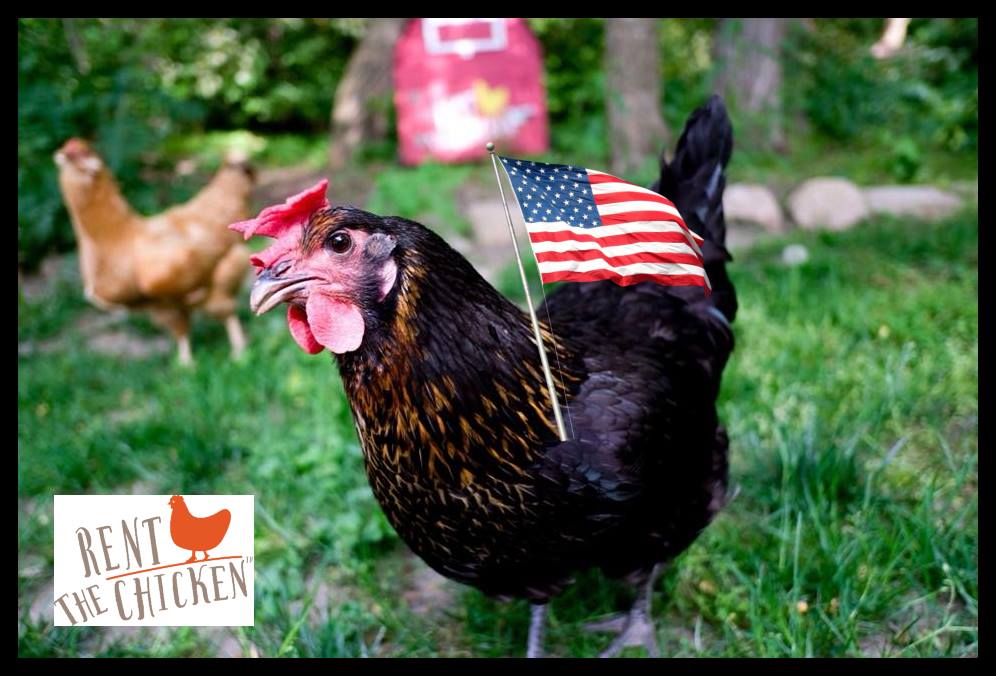By Mary Ann Thomas
The Valley News-Dispatch, Tarentum, Pa.
WWR Article Summary (tl;dr) Jen Tompkins’ motto is: “No experience with chickens? No worries.” She and her husband will set you up with everything you need to have your own backyard chicken, producing farm fresh eggs in no time.
The Valley News-Dispatch, Tarentum, Pa.
It’s “Rent The Chicken,” not “Rent-A-Chicken.”
Local entrepreneurs Phil and Jenn Tompkins stress the distinction because their South Buffalo Township-based business, Rent The Chicken, in their assessment, is on top of the pecking order of live chicken rental businesses, which includes Michigan-based competitor Rent-A-Chicken.
Rent The Chicken continues to add customers after the Tompkins hatched the business five years ago for supplemental income promoting a shared value of the couple: Homesteading — producing yard-to-the-table fresh food.
The success of the business illustrates the popularity of backyard hen houses, especially in urban areas.
Nearly 4 percent of households surveyed in four major American cities planned to have chickens in the coming years, telltale of the growing acceptance of urban farming, according to a 2013 study by the U.S. Department of Agriculture.
It seems among urban dwellers, younger folks have a more favorable opinion of allowing chickens in their neighborhood: The range of pro-chicken opinions ranged from almost 29 percent of respondents 65 years or older to 61 percent of respondents under 25 years old, according to the study.
Interest and acceptance of urban backyard chickens seems to skew younger, said, Dr. Lindsey Garber, author of the study. But she added, “It’s an observation without an interpretation.”
Additionally, a number of respondents in New York City in another USDA survey were fairly new to chicken ownership, she said.
Jenn Tompkins says her clientele is new to chicken keeping; that’s why they want to start out renting them.
“There is a generation gap of people living in the city,” she said. “Their parents grew up in the city and suburbs; maybe grandma had chickens.”
These want-to-be backyard chicken keepers aren’t sure where to start.
“People have cats and dogs; with chickens there’s an unknown there,” Tompkins said.
Her motto: “No experience with chickens? No worries.”
If someone wants to “chicken out” of the chicken rental, she said, they can, no questions asked.
Something to cluck about
It seems not only do people like chickens but like trying them out on a non-committal basis.
For $400 for six months, someone with a small yard can rent two chickens with a portable pen, food, instructions and a help line.
Alyssa Hornberger, 28, of South Buffalo, who works full time at ACMH Hospital, said she didn’t want to invest in a year-round chicken operation.
“I don’t have the time to be a farmer,” she said.
But her two sons wanted chickens after seeing them at friends’ houses, and she liked the idea of fresh eggs and chickens fertilizing her yard.
“This is more for the boys,” she said. “I want them to learn responsibility, providing water and feed for the chickens daily.”
The coop has a small caged-in area, which discourages predators, looks innocuous with its neat, doll-house-sized barn fitting in nicely on the lawn.
The coops were designed by the Tompkins and are made by an Amish artisan just outside of Smicksburg.
The coop has four wheels making it portable, allowing daily moving.
New chicken keepers such as Julie Palmer, 36, of Crafton, likes Rent The Chicken for the experience. She got two chickens in April and would like to adopt them next spring. Palmer isn’t ready to overwinter the birds, which takes a bit more work.
“I have two children and it’s been a great learning experience for them,” she said. “The main thing is they’re learning to be responsible and care for them.
“It’s also exciting to get the eggs and know where they are coming from. We’re learning about the chicken’s behavior and enjoying it.”
A note of caution
With backyard fowl comes the risk of salmonella, a bacteria best known for causing food poisoning.
But it’s not just under-cooked eggs or chicken that can spread the bacteria, but chicken droppings that can end up anywhere on a chicken’s body, shoes and toddlers fingers.
Since 2000, 70 salmonella outbreaks have been linked to live poultry in backyards, according to the national Centers for Disease Control and Prevention.
New chicken keepers should not be afraid of it, according to Andy G. Schneider of Atlanta, Ga., also known as the Chicken Whisperer®, an author and spokesman for the USDA-APHIS Biosecurity for Birds.
“People need to be aware of the risks and know how to prevent salmonella,” he said. “People think by simply washing their hands is all they have to do. But there’s more: Don’t kiss your chicken and don’t step in poop and track it into your house.”














































































































































































































































































































































































